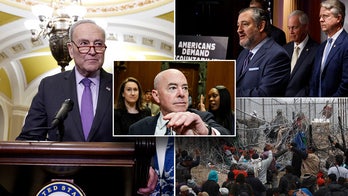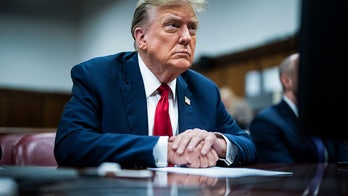Holder: Investigation on IRS won't be political
Attorney general vows the probe on the Internal Revenue Service's targeting of the Tea Party and other conservative groups won't be about political parties and ideologies
WASHINGTON – Eric Holder lashed out at his chief antagonist Wednesday at a congressional hearing where the attorney general was questioned on recent administration scandals, telling Republican Rep. Darrell Issa at the end of a tense exchange that his conduct is "shameful."
Holder’s comments came after Issa accused him of purposely and repeatedly keeping information from Congress.
“No, that’s what you typically do,” Holder responded. Following crosstalk, Holder added, “That is inappropriate and is too consistent with the way in which you conduct yourself as a member of Congress. It’s unacceptable and it’s shameful.”
The heated exchange with the lawmaker who led the charge against Holder regarding the botched Operation Fast and Furious came during a House Judiciary Committee hearing that examined a new set of scandals. Holder was grilled on a series of allegations, including the way the agency tried to find out who was behind a government leak to The Associated Press.
The AP, along with several lawmakers, say the Justice Department infringed on the constitutional rights of the press when it secretly obtained two months' worth of phone records. Lawmakers tried to get answers out of Holder Wednesday but voiced frustration after Holder repeatedly rebuffed questions by claiming he wasn’t involved in the decision-making process.
Wisconsin Rep. James Sensenbrenner was among the group of bipartisan lawmakers who pressed Holder on why the Justice Department secretly collected telephone records.
Holder said he had recused himself from the case because "I am a possessor of information eventually leaked."
He also said he was unable to answer any questions on why the department he oversees failed to negotiate with the AP prior to obtaining subpoenas -- something which is standard practice in these cases.
Holder testified that all the decisions made in the case fell on Deputy Attorney General James Cole’s shoulders. Sensenbrenner then suggested having Cole testify before the House Judiciary Committee. While Congress could call Cole to testify, he would be prohibited from discussing any ongoing case. His testimony would likely yield few answers.
"There doesn't appear to be any acceptance of responsibility for things that have gone wrong," Sensenbrenner said, after suggesting administration officials travel to the Harry Truman Presidential Library and take a photo of the famous sign, "the buck stops here."
Rep. John Conyers, D-Mich., said he was "troubled by the notion that our government would pursue a broad array of phone records over a period of time." But like Sensenbrenner, he was unable to pull any new information about the AP case from Holder.
On Monday, AP President and CEO Gary Pruitt disclosed the government’s action in a letter to Holder that was made public.
In it, Pruitt called the collection of phone records at four AP bureaus a “massive and unprecedented intrusion” of the news agency’s freedom of press rights granted under the U.S. Constitution.
The AP case immediately sparked bipartisan outrage, leading members of both parties to publicly question the government’s actions.
Republican National Committee Chairman Reince Priebus said the attorney general should resign over the issue, adding: "Freedom of the press is an essential right in a free society."
Holder acknowledged Priebus’s calls for his resignation during his opening remarks, though again noted that he was not behind the subpoena.
On Wednesday, New York Sen. Charles Schumer said he plans to reintroduce legislation that would protect journalists from revealing their sources. The bill, which was brought up in 2009, has since stalled in Congress.
The Obama administration has been very aggressive in going after government workers leaking classified information. To date, the White House has brought indictments against five workers. The Defense Department is pursuing a sixth case against the U.S. Army soldier accused of sending classified documents to the anti-secrecy online group WikiLeaks.
Under Holder’s command, the Justice Department has prosecuted more government officials for alleged leaks under the World War I-era Espionage Act than all of the AGs who came before him – combined.





